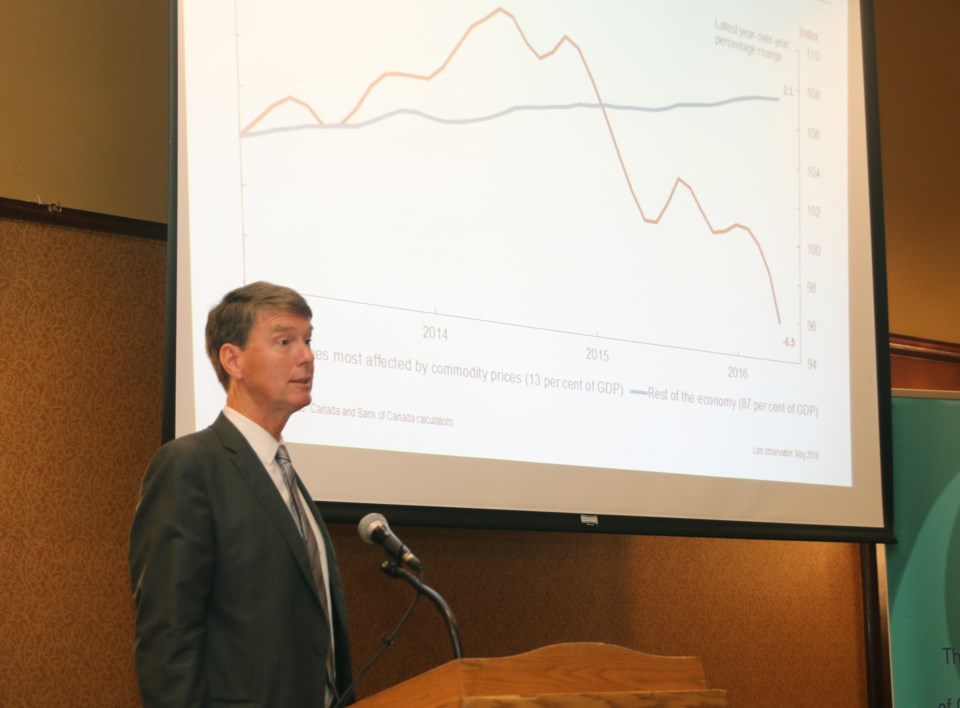The effects of the 2008 recession are still being felt in today’s economy, according to the Bank of Canada, with the resource and commodity sector struggling the most.
Timothy Lane, deputy governor of the Bank of Canada, was in Thunder Bay on Thursday to give a presentation during the Thunder Bay Chamber of Commerce’s Leader’s Luncheon.
According to Lane, the Canadian economy is still operating below its potential. Contributing largely to what Lane calls a saw-tooth pattern economy, is the resource and energy sector, which continues to struggle.
Lane said that the Canadian economy is running on two speeds.
One speed includes the industries affected by the drop in commodity prices declining, while the second speed is the rest of the economy, which is staying relatively level.
“We think in the Canadian economy as a whole, we are starting to get to a point where some of the positive things that are effecting the rest of the economy are going to start to become dominant,” Lane said.
“In particular, the U.S. economy is doing better and the Canadian dollar is at a more competitive level. All that is helping the non-resource parts of Canada. But the resource economy is obviously still facing quite a lot of adjustment and that’s something that is a big part of our outlook.”
Investments in the energy sector have shrunk significantly in the last year and are expected to fall for the next several years. In addition, commodity prices have been falling steadily since 2008 and are projected to fall even further.
“We’ve had about a 60 per cent drop in investment in the oil and gas industry,” Lane said.
“But then in mining it’s been in a different cycle. The prices started to drop about five years ago. The industry has still been ramping up production during that period because there were investments in that period that were already made. But it’s going to take a lot longer for things to wind their way through.”
Charla Robinson, president of the Thunder Bay Chamber of Commerce, brought forward the issue of forestry and softwood lumber.
“It’s definitely a concern,” she said. “We raised the issue of softwood lumber because forestry is the one industry that is going to be on the uptick, so if softwood lumber is going to have some challenges moving forward, so that could be one commodity that will be going back downward.”
Lane said that softwood lumber illustrates the importance of global trade when it comes to stabilizing the economy.
“One of the things that was really beneficial seven or eight years ago when the global recession hit, international leaders made the commitment not to introduce new protectionist measures,” he said. “They agreed that it would be against all their interests to do that.”
For others in attendance, the issue that was top of mind was household debt.
Lane said that the average Canadian household holds more debt now than in the past and it is starting to reach concerning levels.
“You have episodes where people can be lulled into thinking they can get by,” Lane said. “But circumstances change, interest rates change, or income may not be there in the future and they may not be in a position to service those debts.”
“We are conscious of the potential vulnerability,” Lane continued. “There could be a drop in commodity prices or a slowdown in the U.S. That could have an impact on the ability of quite a lot of households to service their debts.”
Robinson agrees that debt is becoming a significant issue and can have severe impacts on a community when it gets too high.
“We are already in a tight economy and if something happens and people suddenly can’t afford to pay that debt, that is a significant impact,” she said.
“I hope that folks are starting to pay attention on what is happening on the forestry side because there could be some rough waters for our community if softwood lumber doesn’t come to an agreement that we can live with.”
